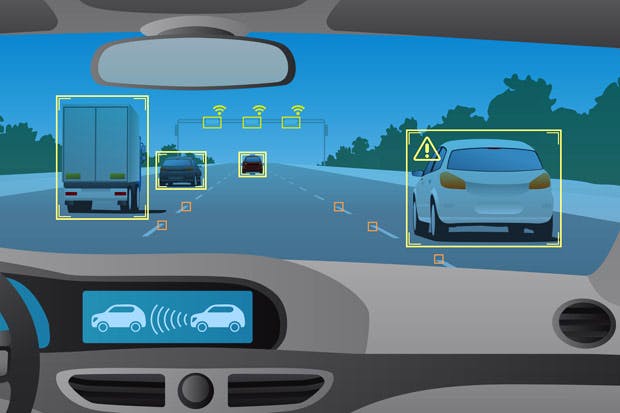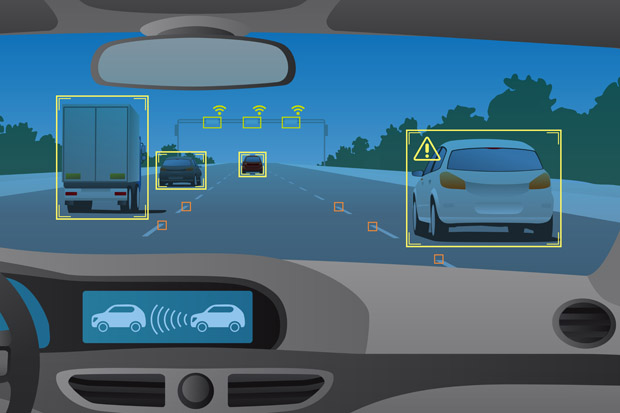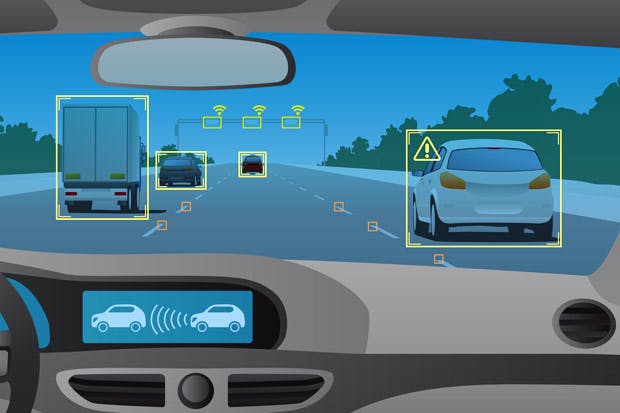On the face of it, there’s something quite appealing about driverless cars. It will be like having a chauffeur-driven chariot at your beck and call, except it will be no more expensive than owning a car. Indeed, it might well be-cheaper because you’ll be less likely to have an accident, so insurance premiums will be lower, and it will use fuel more efficiently. Not only that, but we’re told journey times will be shorter because driverless cars don’t need to keep more than a few inches apart, thereby reducing congestion. And they’ll be quicker still if the inner-cities are reserved for driverless cars only. No need for traffic lights, roundabouts or three-way junctions — just a seamless flow of traffic.
Needless to say, I’m not convinced. Will it really be cheaper to own one than a regular car? I accept that insurance premiums might fall, but what about the depreciation costs? With all that state-of-the art technology, it will be a bit like driving around in a giant iPhone and, as we know, there isn’t much of a market for second-hand iPhones. Indeed, out-of-date driverless cars might well be banned from the roads since the risks associated with them being unable to communicate properly with more recent models are potentially catastrophic.
Even if manufacturers can solve that problem, driverless cars will still age more quickly than regular ones given the pace of technological change — and hence depreciate faster.
What about the shorter journey times? I’m sceptical about that, too. If driverless cars really are all they’re cracked up to be, we’ll see a shift away from public transport towards more car and lorry journeys. Elderly people won’t stop using cars when their eyes and other-senses deteriorate, freight will shift from railways to automated lorries and workers will be more likely to use cars for the daily commute if they can recline in the back seats with their laptops. Dr Zia Wadud of the-Faculty of Engineering at the University of Leeds estimates that once-driverless cars become fully operational, in about 20 years, we will see a 60 per cent increase in road usage. ‘If you can relax in your car as it-safely drives itself to a meeting in another city, that changes the whole equation,’ he says. That will mean longer-journey times, not shorter.
Even if cities become driverless car zones, congestion won’t fall. After all, if the risk of being hit by a car is significantly reduced, as the evangelists of this new technology claim, people will be more likely to cycle or walk from A to B. And that in turn will mean more congestion, not less. No doubt some trains will still run, including the London Underground, and that will be one of the-quickest ways to get around. But if fewer-people are using them they’ll be-unaffordable to all but the superrich. It’ll be trains for the managerial elite and driverless cars for the rest.
And that is my main concern about this new technology — it will exacerbate existing inequalities. I’m not just thinking about the tens of millions of people who earn a-living as taxi drivers in the developed world, most of whom will lose their livelihoods. I mean that existing-inequalities will be embedded — and exaggerated — by driverless cars.
Suppose the only cars allowed in central London are driverless ones. Do you really think the regulatory authorities will insist they all travel at the same speed? Maybe in Stockholm or Copenhagen, but not in London. More likely, the algorithms will be set up so you’re either in a slow car that never exceeds 20mph or a fast one that gets you to your destination as quickly as possible. You’ll be able to switch from one algorithm to another, probably in the course of a single journey (provided you’re in the-latest model), but only if you’re willing to pay through the nose. It’ll be the equivalent of Uber’s ‘surge’ pricing. You’ll be crawling towards an important meeting, becoming-increasingly anxious about being late, when a message will pop up on the dashboard offering to get you there in half the time for an extra £50. You’ll curse yourself for not getting the Tube, then remember that a single journey in Zones 1 and 2 costs £75.
So forget all this hogwash about a utopian, accident-free future in which you’ll be whisked from door to door in air-conditioned comfort at virtually no cost. That’s for the birds. Driverless cars will be slower, more expensive and socially divisive. We should nip this technology in the bud.
Got something to add? Join the discussion and comment below.
Get 10 issues for just $10
Subscribe to The Spectator Australia today for the next 10 magazine issues, plus full online access, for just $10.














Comments
Don't miss out
Join the conversation with other Spectator Australia readers. Subscribe to leave a comment.
SUBSCRIBEAlready a subscriber? Log in